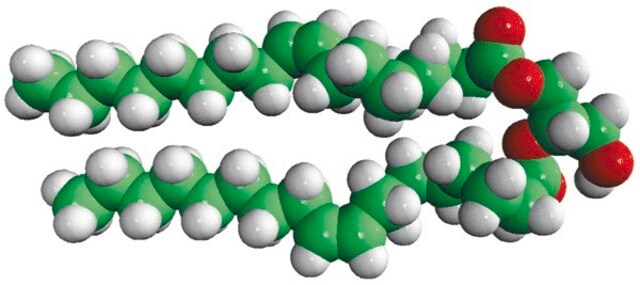850395C
Avanti
18:3 (Cis) PC
Avanti Research™ - A Croda Brand 850395C
Synonyme(s) :
1,2-dilinolenoyl-sn-glycero-3-phosphocholine
About This Item
Produits recommandés
Essai
>99% (TLC)
Forme
liquid
Conditionnement
pkg of 1 × 2.5 mL (850395C-25mg)
pkg of 2 × 4 mL (850395C-200mg)
Fabricant/nom de marque
Avanti Research™ - A Croda Brand 850395C
Concentration
10 mg/mL (850395C-25mg)
25 mg/mL (850395C-200mg)
Type de lipide
cardiolipins
phospholipids
Conditions d'expédition
dry ice
Température de stockage
−20°C
Catégories apparentées
Description générale
Application
- might be used in aqueous lipid-trehalose formulations to assess the long-term storage stability of lyophilized liposomes[1]
- might be used in phospholipid monolayer to study the instability of unsaturated phospholipids at specified conditions[2]
- has been used in aqueous sugar formulations or liposome formulations to characterize its degradation during lyophilization[3]
Conditionnement
Informations légales
Souvent commandé avec ce produit
Mention d'avertissement
Danger
Mentions de danger
Classification des risques
Acute Tox. 3 Inhalation - Acute Tox. 4 Oral - Aquatic Chronic 3 - Carc. 2 - Eye Irrit. 2 - Repr. 2 - Skin Irrit. 2 - STOT RE 1 - STOT SE 3
Organes cibles
Central nervous system, Liver,Kidney
Classe de danger pour l'eau (WGK)
WGK 3
Listes réglementaires
Les listes réglementaires sont principalement fournies pour les produits chimiques. Seules des informations limitées peuvent être fournies ici pour les produits non chimiques. L'absence d'indication signifie qu'aucun des composants n'est répertorié. Il incombe à l'utilisateur de s'assurer de l'utilisation sûre et légale du produit.
EU REACH Annex XVII (Restriction List)
Faites votre choix parmi les versions les plus récentes :
Certificats d'analyse (COA)
It looks like we've run into a problem, but you can still download Certificates of Analysis from our Documents section.
Si vous avez besoin d'assistance, veuillez contacter Service Clients
Déjà en possession de ce produit ?
Retrouvez la documentation relative aux produits que vous avez récemment achetés dans la Bibliothèque de documents.
Les clients ont également consulté
Notre équipe de scientifiques dispose d'une expérience dans tous les secteurs de la recherche, notamment en sciences de la vie, science des matériaux, synthèse chimique, chromatographie, analyse et dans de nombreux autres domaines..
Contacter notre Service technique











